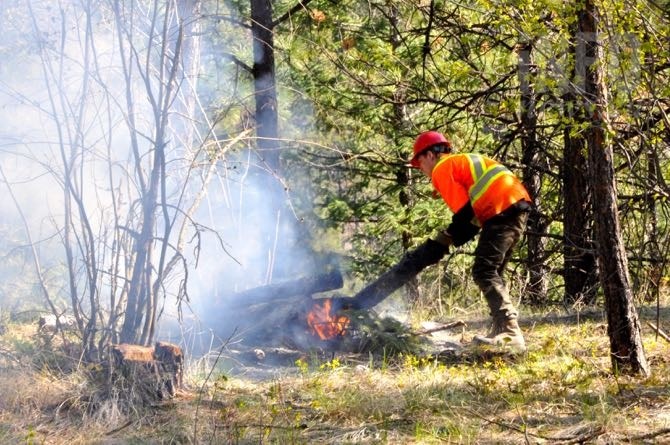
A crew member tends to a slash pile burning in the Bear Creek area, Thursday, April 9, 2015.
(JOHN MCDONALD / iNFOnews.ca)
April 10, 2015 - 10:33 AM
WEST KELOWNA - If you see smoke coming from up Bear Creek in the next few weeks, it’s likely not a raging wildfire. What you’re seeing is actually a fuel mitigation program designed to stop a raging wildfire from starting in the first place.
“What you see behind me is what keeps firefighters awake at night,” West Kelowna Fire & Rescue chief Jason Brolund says during a media tour of the area, Thursday, April 9. “There has been no fuel modification done and it’s an area where the forest butts right up against the community, roadways, houses and critcal infrastructure.”
The chief is very aware of how the mild winter and early spring has left woodlands in the area already dry.
“A fire could start at ground level from something as simple as a cigarette butt thrown from the roadway and spread very quickly up into the canopy of the trees from there it takes right off into the neighbourhood,” he says.
Brolund says abundance of fuel in proximity to the community means fuel reduction rather than prescribed burning is the method of choice.
“Prescribed burning is a lot more risky and is generally used in an area where the margin of error is much broader,” he says. “We can’t be lighting a fire and risk it getting away.”
The Bear Creek fuel reduction effort is a joint program between the Westbank First Nation and the District of West Kelowna, funded by grants from the province and in-kind donations from the District and the First Nation.
Crews have been pruning trees and piling up debris since mid-March into some 1,000 piles which they hope to burn off before April 30, under the watchful eye of the fire department.
Brolund said it costs $25,000 per hectare to complete but the cost is worth it from a fire-fighting perspective.
“It’s very labour intenstive work, it’s hard work, smoky work but wtihout a doubt it makes our job as firefighters much easier if a fire were to start in this area,” he says, adding the criteria for selecting the area was based on the fuel load and it’s previous history as a wildfire hotspot.
“It’s very important to prioritize the areas that make a difference, areas where we’ve had lots of fire in the past and areas where the risk is very high,” he says.
To contact the reporter for this story, email John McDonald at jmcdonald@infotelnews.ca or call 250-808-0143. To contact the editor, email mjones@infotelnews.ca or call 250-718-2724.
News from © iNFOnews, 2015